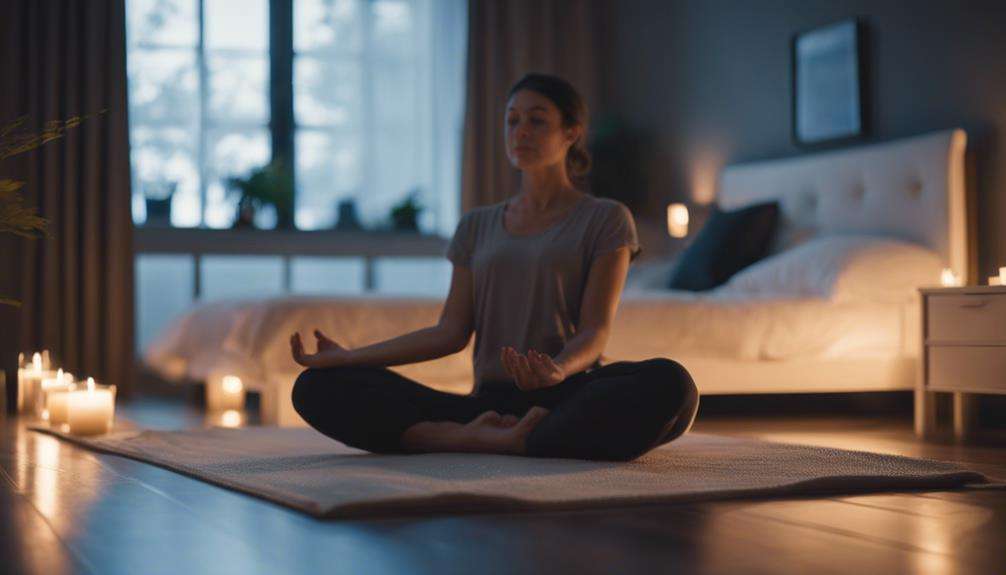Have you ever wondered if incorporating mindfulness meditation and yoga into your daily routine could truly improve your sleep quality?
The potential benefits of these practices on enhancing your overall well-being, including aiding in better sleep, are worth exploring.
By understanding how mindfulness techniques and yoga can positively impact your sleep patterns, you might find yourself on a path to discovering a more restful and rejuvenating night's sleep.
Key Takeaways
- Mindfulness meditation and yoga enhance relaxation for improved sleep quality.
- Body scan meditation promotes awareness and induces relaxation for better sleep.
- Mindfulness practices positively influence brain mechanisms related to sleep.
- Incorporating mindfulness techniques before bedtime reduces sleep disturbances for quality rest.
Benefits of Mindfulness Meditation for Sleep
When struggling with sleep, incorporating mindfulness meditation into your routine can offer a natural and effective way to promote relaxation and improve your overall sleep quality.
For older adults experiencing insomnia or anxiety, mindfulness meditation serves as an adjunctive treatment that can significantly benefit sleep patterns.
Body scan meditation, a practice where you focus on each part of your body in succession, enhances relaxation, which is vital for quality sleep.
Research suggests that meditation and yoga can positively influence brain mechanisms related to behavior and anxiety, ultimately impacting the quality of your sleep.
In cognitive behavioral therapy for insomnia, mindfulness meditation plays a crucial role, highlighting its importance in managing sleep disturbances.
Techniques for Mindfulness Meditation
To enhance your mindfulness meditation practice, incorporating specific techniques can deepen your relaxation and promote better sleep quality. Mindfulness meditation involves focusing on the present moment without judgment, which can enhance relaxation and consciousness.
Deep breathing exercises and body relaxation techniques are integral components of mindfulness meditation, aiding in promoting calmness and reducing stress levels. Body scan meditation, another mindfulness practice, involves sequentially relaxing each body part to increase awareness and induce deep relaxation.
Furthermore, mindfulness meditation plays a crucial role in cognitive behavioral therapy for insomnia by helping individuals regulate their breathing patterns and improve sleep quality. Research strongly supports the effectiveness of mindfulness meditation in enhancing sleep quality and reducing daytime impairment in individuals experiencing sleep disturbances.
Mindfulness Meditation Practices for Sleep

When it comes to improving your sleep quality, practicing mindfulness meditation can offer you a range of benefits.
By focusing on present awareness and using relaxation techniques like body scan meditation, you can enhance your ability to unwind and release tension before bedtime.
Research suggests that integrating mindfulness practices into your routine can help you achieve better sleep and reduce the impact of sleep disturbances on your daily functioning.
Benefits of Meditation
Improving your sleep quality through mindfulness meditation practices is a proven and effective way to reduce daytime impairment and promote relaxation for better rest. Mindfulness meditation has shown significant benefits for older adults struggling with sleep disturbances. Techniques like body scan meditation, which focuses on physical sensations, can enhance relaxation and potentially lead to improved sleep outcomes.
By modulating brain mechanisms related to behavior and anxiety, meditation and yoga contribute to better sleep quality. Additionally, as an adjunctive treatment for insomnia, meditation, especially breathing self-regulation, can be particularly helpful.
Mindfulness meditation is a crucial element of cognitive behavioral therapy for insomnia, highlighting its effectiveness in addressing sleep issues and promoting overall well-being.
Techniques for Relaxation
Enhance your sleep quality through mindfulness meditation practices that focus on relaxation and present awareness. Incorporating these techniques into your bedtime routine can help calm your mind and prepare your body for restful sleep. Consider the following methods to promote relaxation and improve your overall sleep experience:
- Body Scan: Focus on different body parts sequentially, increasing awareness of physical sensations and reducing tension for better sleep quality.
- Guided Meditation: Utilize recordings or follow steps led by another person to aid in visualization, deep breathing, and relaxation, facilitating sleep induction and calmness.
- Mindful Movement: Engage in practices like yoga, tai chi, or gentle stretching to relax the body, calm the mind, and release stress, contributing to improved sleep quality.
Exploring Different Meditation Types
Through exploring different meditation types, you can discover diverse approaches to enhance your sleep quality, promoting relaxation and mental clarity. Mindfulness meditation encourages present awareness, helping you observe thoughts without judgment, fostering a sense of calmness ideal for improving sleep.
Body scan meditation targets physical sensations, systematically relaxing each body part to heighten relaxation and body awareness, potentially aiding in better sleep.
Transcendental meditation involves the use of a mantra to transcend thoughts, leading to pure awareness and a possible improvement in sleep quality.
Loving-kindness meditation focuses on cultivating compassion and positive emotions towards yourself and others, fostering a peaceful mindset conducive to better sleep.
Incorporating Yoga for Better Sleep

To further deepen your journey towards better sleep quality, consider integrating yoga practices into your routine as a gentle yet powerful way to promote relaxation and improve your overall sleep experience. Yoga offers a holistic approach to enhancing sleep quality by combining mindful movement, breathing techniques, and meditation. Here are three ways in which incorporating yoga can benefit your sleep:
- Relaxation and Stress Reduction: Engaging in yoga before bedtime can help release physical and mental tension accumulated throughout the day, promoting a sense of relaxation that prepares your body and mind for restful sleep.
- Improved Sleep Duration: Regular practice of yoga has been linked to better sleep duration, allowing you to experience more rejuvenating rest and wake up feeling refreshed and energized.
- Enhanced Well-being: By weaving yoga into your bedtime routine, you cultivate a deeper connection with your body and mind, fostering overall well-being and a sense of inner peace that can positively impact your sleep quality.
Understanding Yoga Nidra for Sleep
Discover how Yoga Nidra, a guided meditation practice, can deeply relax your mind and body to improve your sleep quality.
Yoga Nidra, often referred to as 'yogic sleep,' involves systematic body scanning and visualizations to induce a state of deep relaxation similar to sleep. By calming the nervous system and quieting the mind, this practice can help reduce stress levels, making it easier to drift off into a restful slumber.
Whether you're a beginner or an experienced practitioner, Yoga Nidra is accessible to individuals of all levels and can be done lying down in a comfortable position. Research suggests that engaging in regular Yoga Nidra sessions may not only enhance sleep patterns but also contribute to your overall well-being.
Potential Benefits of Mindfulness Practices

Let's explore the positive impacts that mindfulness practices, such as meditation and yoga, can have on your sleep quality and overall well-being. Engaging in mindfulness meditation and yoga can offer a range of benefits that go beyond just relaxation. Here are some ways these practices can enhance your sleep quality:
- Reduction in Insomnia Symptoms: Mindfulness practices have been shown to decrease insomnia symptoms, making it easier for you to fall asleep and stay asleep throughout the night.
- Emotional Regulation: By practicing mindfulness techniques, you can better regulate your emotions, reducing stress and anxiety that often interfere with a good night's sleep.
- Enhanced Self-Awareness: Mindfulness meditation and yoga can improve self-awareness, helping you understand your thoughts and feelings better, leading to a calmer mind at bedtime.
These benefits extend beyond just the hours you spend sleeping, contributing to a more balanced and rejuvenated state of mind throughout your day.
Safety Considerations for Mindfulness Meditation
Considering the safety aspects of mindfulness meditation is essential to ensure a positive and beneficial experience for your well-being. While mindfulness meditation is generally safe, it's important to be aware of potential side effects such as frustration or boredom that some individuals may experience. Monitoring your mental state during practice is crucial, as meditation can sometimes lead to increased anxiety or negative emotions. If you have specific mental health conditions, consulting healthcare providers before starting a meditation practice is recommended to ensure safety.
To prevent physical discomfort or injury, it's vital to practice moderation and self-awareness during meditation to avoid overexertion. Approaching mindfulness meditation with an open mind and seeking guidance from experienced practitioners if needed can help ensure a safe and beneficial experience. Remember, your health and well-being should always be the top priority when engaging in mindfulness practices.
Frequently Asked Questions
Does Yoga Improve Sleep Quality?
Yoga poses, relaxation techniques, and breathing exercises can enhance sleep quality. They improve sleep patterns, reduce stress, and promote a strong mind-body connection. Establishing a bedtime routine, optimizing your sleep environment, and practicing good sleep hygiene can further support restful sleep.
Does Meditation Before Sleep Improve Sleep Quality?
When you meditate before sleep, you can improve sleep quality. It helps with stress reduction, enhances your bedtime routine, strengthens the mind-body connection, and promotes relaxation. Deep breathing aids in quieting the brain and improving sleep patterns.
How Can I Improve My Sleep Quality?
To enhance your sleep quality, focus on improving your sleep hygiene, managing stress, incorporating relaxation techniques, establishing a bedtime routine, nurturing the mind-body connection, practicing deep breathing, optimizing your sleep environment, exploring cognitive therapy, and monitoring your sleep patterns.
What Type of Meditation Is Good for Sleep?
You might think body scan meditation is spot on for sleep. It tunes into physical sensations, boosts awareness, and eases you into relaxation. Try it for a peaceful slumber ahead.
Conclusion
In conclusion, mindfulness meditation and yoga offer effective tools for improving sleep quality. By incorporating these practices into your daily routine, you can experience relaxation, reduced stress, and a calmer mind, leading to better sleep patterns.
While some may question the time commitment required for these practices, the benefits of improved sleep quality far outweigh the investment. Remember, prioritizing your well-being through mindfulness and yoga can lead to a more restful and rejuvenating night's sleep.






